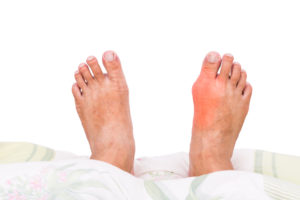How are bunions treated?
- Posted on: Jan 15 2021
- Leave a response

What are bunions?
When bones in the front part of your foot move out of place, they can cause the tip of your big toe to pull toward the smaller toes. This forces the joint at the base of the big toe to stick out and lead to a bony bump.
Signs & symptoms
In addition to the bulging bump, the most common signs and symptoms include swelling and redness around the big toe joint, corns or calluses where the first and second toes rub against each other, intermittent or ongoing pain, and limited movement of the big toe.
Causes & risk factors
As mentioned before, stress or injuries on the front part of the foot can lead to bunions. Inherited foot anatomy may be to blame as well. Foot deformities and certain medical conditions such as rheumatoid arthritis make you more likely to develop bunions. Wearing high heels or ill-fitting shoes can increase your risk of bunions as well.
Diagnosis & treatment
When you have ongoing pain or decreased movement in your big toe or foot, it is time to visit your doctor for diagnosis and treatment. An examination of the foot and x-ray can help identify the severity and the possible cause of the bunion.
The severity of the bunion will determine treatment. Even though a bunion will require surgery to return to normal position, there are conservative treatments you can try first. This may consist of changing to shoes that have more space around the toes or placing orthotic inserts into the shoe to help more evenly distribute pressure.
Other treatments include padding, taping, or splinting the joint area and toes so that the foot is in a normal position. Pain medications and corticosteroid injections may also be indicated, as well as icing to relieve inflammation.
If you have bunions that are causing frequent or chronic pain, surgery may be necessary. To learn more about your treatment options, call us at 707.544.3400 to make an appointment.
Posted in: Bunion

